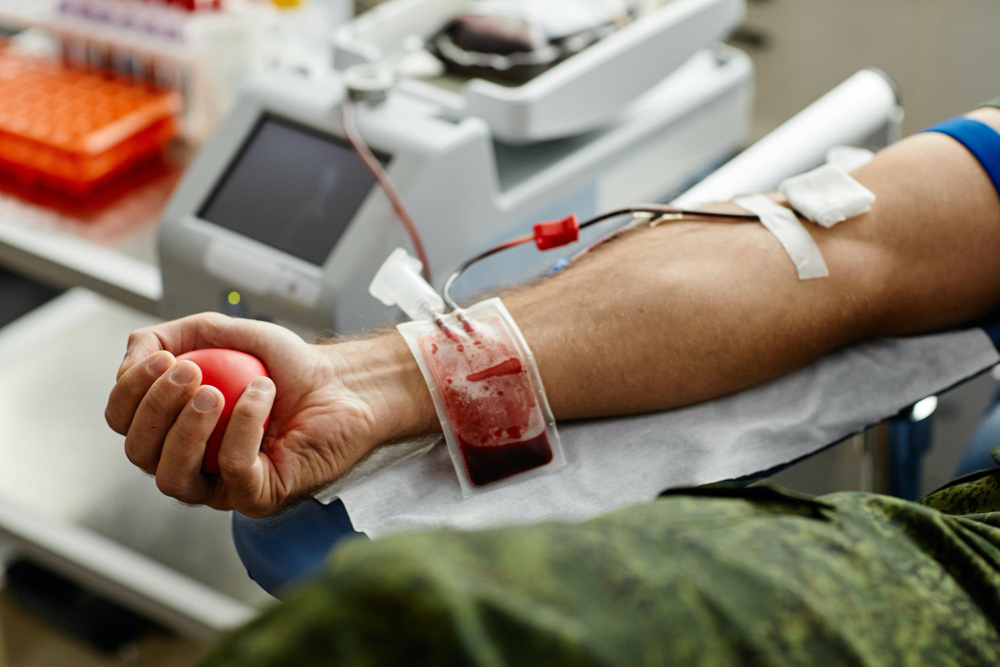- Fast results
- 4,000+ locations
- 4.8 star rating
Need Help? (888) GET LABS



With the surge of blood donation drives every year, there’s a good chance that you may have been a regular donor or planning to be one. But if you’re neither, now is an even better time to learn why you should do it.
According to the American Red Cross, about 6.8 million people donate blood every year. Every liter of plasma they give is used to help patients who require transfusion prior to surgery, those with chronic diseases, and more.
While it’s apparent that you get to help out your community when you donate, you shouldn’t miss the remarkable physical benefits of blood donation brings to your body like:
Find out how you acquire these advantages when you donate blood as you read further.
A critical requirement of blood donation and receiving blood, for that matter, is knowing your blood type. It’s one of the fundamental information medical technicians need before performing transfusions for surgeries and creating diet plans. If you’re unsure or unaware of which blood type you have, get the blood typing test for ABO and RH groups.
Blood donation has plenty of social, mental, and physical benefits that cover both the donor and the receiver.
Donating blood has always been free and fosters altruism. However, you may be getting more than you expect as a donor, especially if you do it regularly.
Primarily, those who give blood help out individuals who require immediate or regular transfusion, such as those who have or in the following conditions:
Furthermore, regular blood donation driven by volunteerism has also been known to make the donors happier and less prone to depression. Knowing that you could save up to three lives by supplying blood develops a sense of purpose that nourishes a good feeling of accomplishment.
For regular donors, ensuring they are healthy all the time becomes a habit. Their perception of wellness changes as they consider their additional beneficiaries from maintaining robust health.
Nonetheless, only a few blood donors truly understand that giving blood also improves health. This may sound surprising considering the adverse short-term side effects of blood donation. Still, multiple studies supported the notion of the long-term health benefits regular blood donors can get.
Donors gain tons of health benefits when they donate blood regularly. People often assume that blood loss is a huge disadvantage. However, this is simply untrue by a huge mile.
The blood that got out of your system gets replenished with new, healthy onese after 48 hours. The replacement alone already has a positive effect on your organ function and cellular nutrient distribution.
But to be more specific, here are eight remarkable physical benefits you get as a donor when your donate blood:
Not everyone can donate blood. You have to be fit and healthy to pass the basic requirements. As a result, blood drives often include free health screening. This is to determine potential donors free of infections or chronic medical conditions that can put the donation to waste.
During this checkup, your blood pressure and pulse will be evaluated. Some blood donation centers also include blood tests for diseases like hepatitis, and sickle cell anemia.
Nevertheless, whether the blood drive includes lab tests or not, one medical procedure remains common – a general checkup. During this stage, the doctor may uncover underlying conditions that require immediate treatment based on recent symptoms or your family history of the disease.
Donating blood can lower your risk for depression and other mental health problems. In a study conducted by the University of Witten/Herdecke, the clinical group of blood donors showed higher levels of well-being compared to the control group. The assessment was based on several parameters including cortisol (stress hormone) levels.
Furthermore, the feeling of satisfaction you get when you donate blood for those who need it brings a surge in your dopamine levels. Dopamine is a neurotransmitter which acts as your brain’s reward center. You feel more motivated, energetic, and content.
Hemochromatosis is a condition wherein iron accumulates in the blood in harmful levels. To avoid its life-threatening effects, giving blood can be advantageous. It unloads the iron-build up that could affect organ function. Moreover, your blood can still be used for transfusion as long as you are eligible as a donor.
However, it’s important to know that not all blood donation centers accept donors with the said condition. You have to check their eligibility criteria to be completely certain.
People with hypertension can still be eligible as blood donors provided that they have normal blood pressure at the time of the donation.
According to the American Red Cross, if you have hypertension you can still give blood if your systolic level is below 180 and the diastolic is below 100.
Plus, when you regularly donate and you have hypertension, it may help the condition by stabilizing your blood pressure.
In a study among 292 blood donors, it was found that blood donation can influence blood pressure reduction especially among hypertensives.
Although research has not established definitive evidence on how blood donation can prevent heart attack, its impact on blood pressure reduces the risk for cardiovascular disease and stroke.
Regular blood donation also leads to improved blood circulation which can reduce blockage in the arteries.
In a study conducted by the University of Kuopio, Finland, it was shown that blood donors have an 88% reduction in the risk for myocardial infarction and coronary disease.
Iron build up affects your liver. However, if you regularly donate blood, you can avoid this condition as iron levels reduce when your blood cells are replenished. As a result, you get extra protection against diseases like hepatitis C, non-fatty liver disease (NFLD), cirrhosis, and other issues related to the said organ.
Likewise, NAFLD can be diagnosed if you donate blood regularly during the health screening. This provides you a better opportunity to detect the condition early and seek the necessary treatment immediately.
Extracting your blood may come with side effects that occur and diminish quickly. These are normal occurrences if they happen for a short while during and after the extraction.
However, if they persist for hours or even days after you donate blood, you should contact the blood bank or blood donation center.
Here are the most common side effects you may expect when donating blood:
You may feel dizzy, lightheaded, or nauseous after giving blood due to the temporary lowering of the blood pressure. As blood exits your body, your heart pumps less due to the shift in volume. Hence, blood donation is typically done while lying or sitting down.
After completing the procedure, it’s best not to stand up quickly. If you still feel dizzy, raise your legs and put a pillow underneath to help in your blood circulation.
Some donors may experience bruising after the blood donation. This is due to the blood leaking on other tissues. When your vein is pierced by a needle, blood tends to exit the wound causing bruises that eventually fades.
It’s normal to feel pain after you donate blood. But it should subside pretty quickly. On the other hand, if your arm, hand, or finger become painful for a longer time, it could be due to a nerve injury. You should inform your medical attendant immediately.
It’s very unlikely but possible to bleed after donating blood. This can be due to slow tissue healing on the site of the injection. If this happens, it’s best to seek immediate medical attention.
Most people perceive giving blood as a noble act, not because you’re literally going to sacrifice a fraction of your blood, but because it’s not exactly the most painless medical experience in the world. Nevertheless, what’s a little pain compared to the life-saving drive of donating blood.
Plus, you get to replenish your lost blood with new healthy ones promoting better organ function and protecting you from several diseases. These are bonuses you certainly should grab.
So, if your mind’s made up, and you’re ready to donate blood, don’t forget to prepare your body by eating healthy meals, getting enough rest, and consulting with your doctor regarding medications. You can also get a wellness checkup and a blood typing test if you want to save time during screening.
Additional Readings

10 Essential Blood Tests You Should Take Every Year
Here are the 10 lab tests that adults should be testing every year.

10 Things You Need to Know Before Receiving Your Blood Test Results
Blood tests are a way to keep track of your blood chemistry and bodily functions here are 10 things to know when you receive your results.

4 Easy Steps to Get Your Blood Tested
Lab testing is essential and here are 4 easy steps to get tested.


We now offer pharmacy discounts through our PersonalabsRx platform.
We now offer pharmacy discounts through our PersonalabsRx platform.